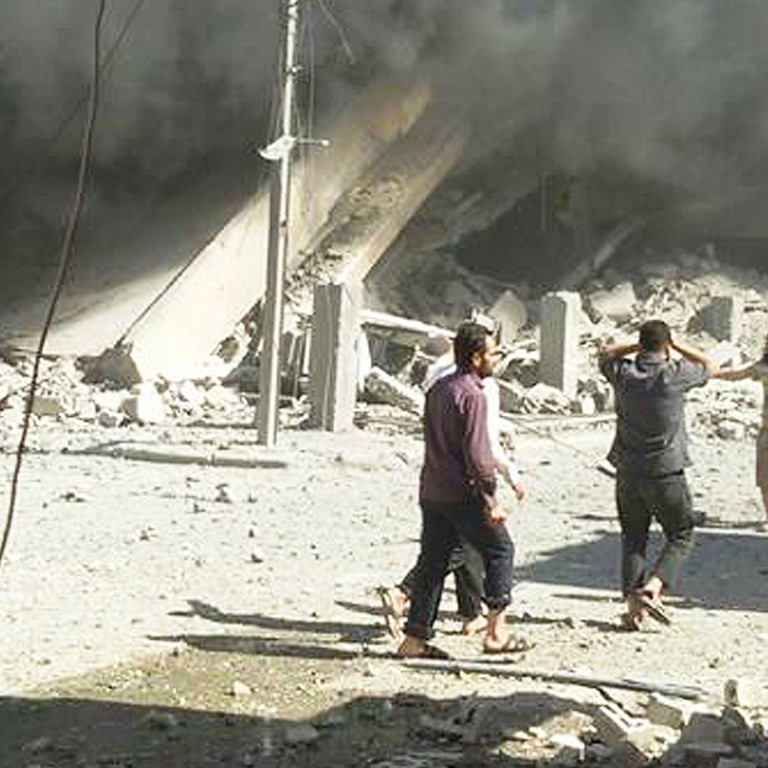
Vladimir Putin launches air strikes on ‘terrorists’ in Syria, but are his sights set on propping up Bashar al-Assad?
Russia insists that its initial eight targets were Islamic State militants, saying its warplanes struck command points, military equipment, arms depots, and warehouses controlled by the terror group.
Russian President Vladimir Putin’s dramatic decision to launch airstrikes inside Syria is forcing the world to confront his latest military adventure, against a backdrop of deep distrust over whether defeating Islamic State (IS) is his only goal.
It is Russia’s first military engagement outside the former Soviet Union since the occupation of Afghanistan in 1979.
Russian warplanes carried out strikes on Wednesday in several provinces along with Syrian government aircraft, with both Moscow and Damascus presenting the operation as targeting IS militants.
While the US and its allies want to see the extremists crushed, Putin’s actions - the US said he bombed an area where the terror group doesn’t operate - fuelled fears that he really just wants to prop up ally President Bashar al-Assad, who Western leaders say should step aside. It also raises the odds of high-stakes accidents as Russian and US jets share the same air space but potentially different missions.
“If it is a prelude to a diplomatic process that maybe even makes Russia more willing to assist in a transition then it could have even a positive aspect,” said Philip Gordon, a former White House Coordinator for the Middle East, North Africa and Gulf Region. “Anytime you are introducing military forces into a war zone it’s potentially dangerous.”

“We agreed that the military should get into contact with each other very soon,” Lavrov said alongside Kerry at the UN, steps away from Picasso’s anti-war painting “Guernica”.
Kerry earlier in the day said strikes against the self-declared caliphate were welcome but added that he would have “grave concerns” if Russia attacks areas where Islamic State isn’t operating. Defence Secretary Ash Carter said that seemed to be the case.
Russia insists that its initial eight targets were Islamic State militants, saying its warplanes struck command points, military equipment, arms depots, and warehouses controlled by the terror group. Yet Putin has also called other anti-Assad rebels in Syria backed by the US “terrorists”.
Read more: ‘We’re tired of collecting limbs’: At UN event, speakers call for end to Syria barrel bombs
The head of Syria’s main Western-backed opposition, Khaled Khoja, said 36 civilians, including five children, died as a result of Russian bombing: “They are there to uphold a regime that is on its last legs,” he added, referring to Assad.
Lavrov rejected the accusation. “We take full responsibility for our targets,” he told reporters at the UN. “We are very carefully controlling to ensure that these surgical strikes have been surgical and that their targets were positions, objects, equipment and weaponry of terrorist groups.”
The Russian sorties were welcomed by Iraq, which has seen swaths of its territory overrun by Islamic State militants. This month it agreed to share intelligence with Russia and Iran to help combat the terror group. Foreign Affairs Minister Ibrahim Al-Jaafari said that "weakening ISIS bases in Syria" will "weaken ISIS locations in Iraq as well."
It’s not just heightening tensions with the West that are at stake. Putin’s moves threaten to alienate Sunni Muslims and drag Russia ever more deeply into a deadly conflict that has no end in sight. Putin, in a meeting with officials Wednesday in Moscow, indicated it was a risk worth taking.
“The only right way to fight international terrorism” is to “act preventively,” Putin said. “To fight and destroy militants and terrorists on the territories that they already occupied, not wait for them to come to our house.”
As for China, Foreign Minister Wang Yi told the Security Council that the world needed to get a grip on the humanitarian crisis and push the peace process.
“The Syrian crisis has been going on for five years now. The international community cannot look on without lifting a finger, but also ought not to interfere arbitrarily,” Wang said, according to a Foreign Ministry statement released on Thursday yesterday.
“A political resolution for the Syrian crisis is the fundamental way out,” he added.
There was no direct mention of either the air strikes or Assad. China generally votes with Russia on the Syria issue.

